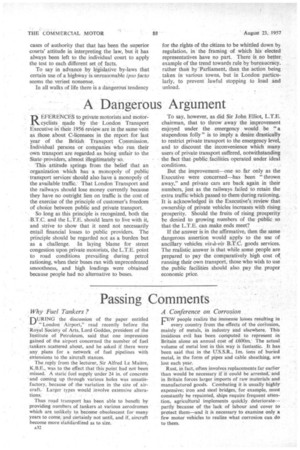A Dangerous Argument
Page 34

If you've noticed an error in this article please click here to report it so we can fix it.
REFERENCFS to private motorists and motor...cyclists made by the London Transport Executive in their 1956 review are in the same vein as those about C-licensees in the report for last year of the British Transport Commission. Individual persons or companies who run their own transport are regarded as being unfair to the State providers, almost illegitimately so.
This 'attitude springs from the belief that art organization which has a monopoly of public • transport services should also have a monopoly of the available traffic.' That London Transport and the railways should lose money currently because they have no outright lien on traffic is the cost of the exercise of the principle of customer's freedom of choice between public and private transport.
So long as this principle is recognized, both the • B.T.C. and the L.T.E. should learn to live with it, and strive to show that it need not necessarily entail financial losses to public providers. The principle should be regarded not as a burden but as a challenge. In laying blame for street congestion upon private motorists, the L.T.E. point to road conditions prevailing during petrol rationing, when their buses ran with unprecedented smoothness, and high loadings were obtained because people had no alternative to buses. To say, however, as did Sir John Elliot, L.T.E. chairman, that to throw away the improvement enjoyed under the emergency would be "a stupendous folly" is to imply a desire drastically to restrict private transport to the emergency level, and to discount the inconvenience which many, users of private transport suffered, notwithstanding the fact that public facilities operated under ideal conditions.
But the improvement—one so far only as the Executive were concerned—has been "thrown away," and private cars are back again in their numbers, just as the railways failed to retain the extra traffic which passed to them during rationing. It is acknowledged in the Executive's review that ownership of private vehicles increases with rising: prosperity. Should the fruits of rising prosperity be denied to growing numbers of the public so that the L.T.E. can make ends meet?
If the answer is in the affirmative; then the same dangerous assertion would apply to the use of ancillary vehicles vis-a-vis B.T.C. goods services. The realistic answer is that while some people are prepared to pay the comparatively high cost of running their own transport, those who wish to use the public facilities should also pay the proper economic price.




































































































